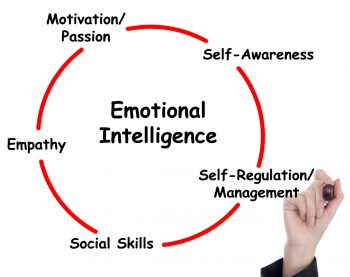
In today’s competitive world, emotional intelligence (EI/EQ)) is no longer a nice-to-have—it’s a must-have. Regardless of your role, whether you’re a budding professional, an experienced leader, or a manager the ability to recognize, understand, and manage our own emotions while also being able to recognize, understand, and influence the emotions of others is a key component in successful leadership.
The key components of EI (EQ) include:
- Self-Awareness
- Self-Regulation
- Social Regulation
- Motivation
The Importance of Emotional Intelligence (Emotional Quotient)
Being self-aware helps you gain a deeper understanding of yourself, which leads to better decision-making, improved relationships, and enhanced leadership capabilities. Here’s why developing self-awareness is essential:
- Improved decision-making: When you are aware of your emotions and how they impact your choices, you can make more informed and rational decisions.
- Better relationships: Understanding your own emotions allows you to communicate more effectively and empathize with others, which strengthens personal and professional relationships.
- Enhanced leadership: Self-aware leaders are more attuned to their teams’ needs and motivations. They can lead with empathy and create a positive work environment.
- Personal growth: Recognizing your strengths and areas for improvement fosters continuous personal and professional development.
To develop Self Awareness ask yourself:
- What am I experiencing right now?
- Why am I experiencing that?
- How is it impacting me and my ability to perform?
Think of self-awareness as how accurately we perceive our emotional state.
To develop Self-Regulation, ask yourself:
- What could (or should) I do with/about what I am experiencing?
- Why should or shouldn’t I?
- How can I appropriately express or impact what I am experiencing?
Think of self-regulation as your ability to regulate your emotional state. This could mean you attempt to regroup and get yourself to a better place emotionally, or even determine that your emotions are too extreme at the moment to make a decision.
To develop Social Awareness, consider the following questions:
- What is the other party experiencing in this situation?
- Why might they be experiencing that?
- How will it impact their ability to perform?
Think of social awareness as having your antenna up, that is, how actively are you trying to pick up on the signals others are sending.
To develop Social Regulation, consider the following questions:
- What could or should I do in this situation?
- Why should/shouldn’t I?
- How can I positively influence this situation to leave it better than I found it?
To develop motivation, actively ask yourself:
- What is my overarching goal?
- Why is it important to me?
- How can I use this situation to move closer (or at least not away from) my goal?
Developing motivation is about keeping the end in mind and ensuring that you manage your emotions and the situation to help move you toward your desired outcome.
As you become more attuned to your patterns of self-awareness, cycling through these questions will become easier. With practice, you’ll gain deeper insights into your personal style, significantly enhancing your overall confidence. Over time, your comfort with emotional intelligence will solidify, making the process more intuitive.
If you would like to kick start this process, please take a look at both the DISC and EQ assessments. These two assessments provide an excellent starting point for developing your Emotional Intelligence.
